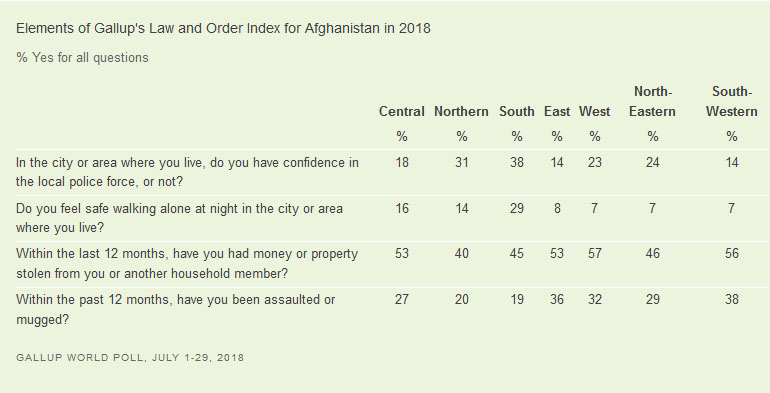By RJ Reinhart and Julie Ray
WASHINGTON, D.C. -- Afghans could see a peace deal with the Taliban and an end to the nearly 18-year war in Afghanistan -- all ahead of the country's presidential election in late September.
Gallup data collected since 2008 in Afghanistan offer insights into what has happened to Afghans' sense of safety and security during the violent decade that the potential peace deal has been in the making.
Quick Summary: Even as the Taliban have been talking peace, the militant group has continued to attack civilians, and it has threatened to disrupt the presidential election that is currently scheduled to take place on Sept. 28. The stakes for the peace deal are high; if it fails, the fighting could get worse and push the already high civilian death toll even higher.
Gallup's surveys in the country paint an increasingly bleak picture of the state of safety and security in the country, where, ahead of their parliamentary election in 2018, the percentages of Afghans who feel safe walking alone at night where they live and feel confident in their police were not only the lowest on record for the war-torn country, but the lowest in the entire world.
Law and Order Index Drops to New Low in Afghanistan: Gallup's Law and Order Index is a composite score based on people's reported confidence in their local police, their feelings of personal safety, and the incidence of theft and assault or mugging in the past year. The higher the score, the higher the proportion of the population that reports feeling secure.
After tying with Venezuela in 2017 for the "least secure" country in the world with a score of 45 on the Law and Order Index, Afghanistan's score dropped to a new low of 38 in 2018.

As might be expected, the security situation varies substantially across Afghanistan, with Afghans in the Southern region of the country rating their safety and security the highest at 51, and those in the Southwest the lowest at 31. In the Central region, home to the country's capital Kabul, Afghans' ratings of their security situation earned them a score of 38 on the index.

The regions with the lowest index scores are all areas where the Taliban have retaken control or where control is contested between the Afghan government and the Taliban. While these three regions saw drops in their index ratings between 2017 and 2018, the most substantial drop in index ratings occurred in the Central region, again home to the capital. The Central region saw an 11-point drop in its index score from 49 in 2017 to 38 in 2018.
Only 13% of Afghans Feel Safe Walking Alone at Night: Afghans in 2018 were less likely to feel safe walking alone at night than any point over the past decade. The 13% who said they felt safe ties for the lowest figure Gallup has recorded for any country worldwide on this question since 2006; a similar 12% of Venezuelans said they felt safe in 2016.
As bleak as the 13% looks, in four regions of the country, the numbers are in the single digits. Even in the Central region of the country, where a substantial number of the provinces remain in government hands, only 16% report feeling safe walking alone at night.

Confidence in the Police Drops to Record Low: Afghans' confidence in the country's security services has fallen sharply over the past two years as the Taliban have taken control of more territory and civilian casualties have mounted. Twenty-two percent of Afghans in 2018 said they have confidence in their local police, tying with Venezuelans for the lowest in the world.
The situation is little better across Afghanistan. Only in the country's South do more than a third of the population report having confidence in their local police. And, in the Central, East, and Southwestern regions, fewer than one in five have confidence in the police, again likely possibly related to Taliban resurgence in those areas.
Theft and Assault Hit Record Highs: As if Afghans don't already have enough to worry about, they were more likely to have been victims of theft and assault in 2018 than at any previous point in the past decade. Half of Afghans (50%) said they or someone in their households had money or property stolen in the past year, and nearly three in 10 (29%) said they had been assaulted or mugged.
No fewer than four in 10 Afghans in any of these regions reported having been the victims of theft. Most of the recent increases in crime have been in the country's South and Central regions.
Implications: Although the Taliban have vowed to disrupt the coming presidential election, for many Afghans this is largely a replay of the group's rhetoric ahead of the parliamentary election last year when millions of Afghans braved their growing fears about their safety and voted.
The difference this election is that there is a peace deal on the table, and if it succeeds, Afghanistan's next president will be presiding over a country that is no longer at war, but also without the support of U.S. troops and other foreign forces. Regardless of who this person will be, one of the first priorities will need to be to restore Afghans' sense of security and their faith in the rule of law.



